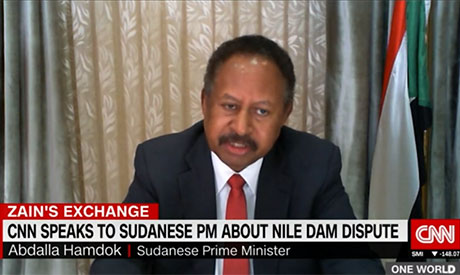
A snap shot from CNN video of Sudanese Prime Minister Abdullah Hamdok during the interview on Tuesday May 4, 2021.
Sudanese Prime Minister Abdullah Hamdok said on Tuesday that the Grand Ethiopian Renaissance Dam (GERD) dispute “was a serious matter related to the security and future of millions in people in Egypt and Sudan.”
The Sudanese prime minister’s comments came during an interview with CNN's Zain's Exchange on Tuesday.
In an answer to a question about the recent call by Egyptian President Abdel-Fattah El-Sisi on Ethiopia not to compromise Egypt's share of the Nile water, Hamdok told CNN ”I think when President El-Sisi made this statement, he would like — like us — to express to the rest of the world the seriousness of the issue. It is time bound."
“We would like the rest of the world to understand the gravity of the situation. We can easily resolve the issues related to the GERD in a matter of weeks.”
In an answer to a question about Sudan’s call for international mediation to resolve the GERD dispute, the Sudanese prime minister said that while Sudan has called for an international quartet meditation made of the UN, EU, African Union, and the United States in the GERD dispute, it was the first country to promote the motto of African solutions for African problems.
“The African Union is our primary institution. We respect it, but we proposed to add to the role of mediators. They were already there — in the talks — as observers in the past year, we just want them to elevate their role from observers who sit their passively to the role of mediators who can help us reach an agreement soon,” he told CNN.
Ethiopia has rejected Sudan's proposal of an international mediation quartet, whereas Egypt welcomed and supported it.
In an answer to a question on what prompted Sudan to recently take a harder stance in the GERD dispute, Hamdok said, “The GERD can provide a lot of benefits to the three countries. But for these benefits to materialise, we have to reach a binding agreement that would allow us to plan our life, to be able utilise the water coming from the dam in a way that would allow agricultural production and livelihood.”
“Without that binding agreement, we would always be at the mercy of Ethiopia to give it today and close it tomorrow. This is why we are asking for a binding agreement based on international law.”
Meanwhile, in an interview to Al-Ghad TV channel on Tuesday, Sudanese Irrigation Minister Yasser Abbas revealed that Sudan has not received yet an answer concerning the letter it sent to the UN Security Council concerning the GERD dispute.
The minister added that the letter was part of the diplomatic and political path taken by Sudan to push Ethiopia back to the negotiations table once again before Addis Ababa goes forward with the second filing of the GERD in July.
He also stated that Sudan will take the legal path and file a lawsuit against the Italian construction company and Ethiopia if they go ahead with the second filing.
Tensions escalated in recent weeks after the latest round of talks in Kinshasa in April failed to produce an agreement to re-launch the stalled negotiations.
Ethiopia’s rejection of several proposals by Egypt and Sudan on a negotiation mechanism, which include an international quartet mediation, led to the collapse of the Kinshasa talks.
The three countries have resorted to diplomacy in recent weeks, briefing regional and international counterparts on their stances and developments on the negotiations.
The three countries have sent letters to the UN Security Council to clarify their positions on the dam issue, and traded accusations over who is responsible for the collapse of the talks.
Egypt sent its foreign minister on a six-nation tour in Africa to clarify the country’s stance on the dispute.
Addis Ababa said it plans to move ahead with the second filling of the dam despite objections by Egypt and Sudan amid the absence of a legally binding deal.
Short link: